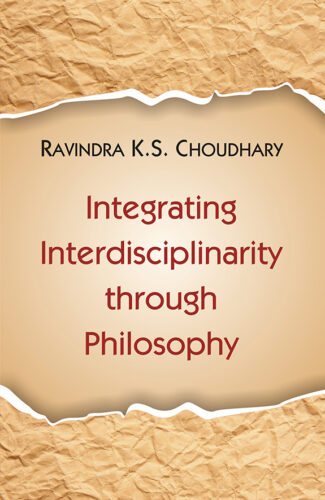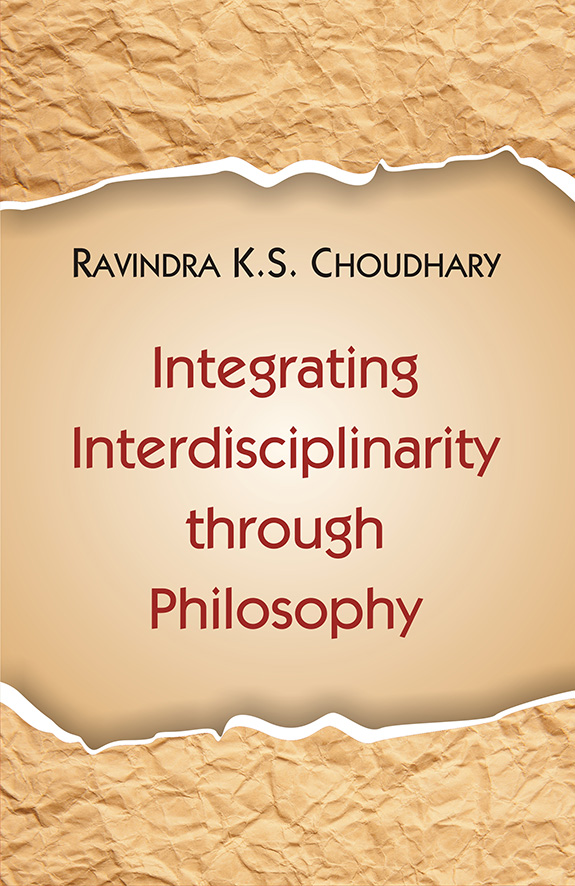-


Integrating Interdis...
Integrating Interdisciplinarity through Philosophy
by: Ravindra K. S. Choudhary₹1,710.00
ISBN: 9788124610824
Year Of Publication: 2021
Edition: 1st
Pages : xxi,490
Bibliographic Details : Indices
Language : English
Binding : Hardcover
Publisher: D.K. Printworld Pvt. Ltd.
Size: 25cm
Weight: 858
In the context of current knowledge situation, when every discipline has something to contribute to interdisciplinarity, it seems quite apposite and opportune that philosophy should reinforce and reassert its traditionally cherished role of integrating human knowledge. The Book at hand is an attempt to that end. It is set to take the readers on an enthralling journey across disciplinary boundaries and inspire them to reach a comprehensive conceptual framework for human knowledge at large.
The book delves into the idea and the philosophy of interdisciplinarity, and then unravels the genealogy, dynamics, and myriad configurations of the highly complex phenomenon. It goes on to assess impact, advantages and critical issues involved in interdisciplinarity, while outlining an Indian view of it. The book, thus, explores the conceptual connections, fundamental issues and intrinsic implications of a myriad variety of interdisciplinary study and research, within and beyond academia. The book also attempts to develop necessary theoretical perspectives and a broader conceptual framework in this connection. Ultimately, it seeks to reach, as far as possible, a systematic conceptual account of varied and variegated interdisciplinary studies and researches by integrating them philosophically.
The present work is thus, intended for a wider audience, and not only for the practitioners of philosophy as an academic discipline. It is a must read across the intellectual spectrum, regardless of one’s disciplinary affinities and affiliations. It is wide-ranging in its concerns, far-reaching in implications, and highly resourceful and relevant for generalists as well as specialists, scholars and scientists, researchers and curriculum developers, educational administrators and policy-makers.
Preface
Acknowledgements
1. Introduction
Statement of the Problem
The Need, Aims and Objectives
Method and Approach
Hypothesis and Assumptions
General Plan of the Work
Sources and Materials
2. Idea of Interdisciplinarity
What is Interdisciplinarity?
Two Conceptions of Interdisciplinarity
Interactionist Conception of Interdisciplinarity
Integrationist Conception of Interdisciplinarity
Interdisciplinarity as Method and as Content
Interdisciplinarity as Content
Interdisciplinarity as Method
Interdisciplinarity and its Common Confusables
Multidisciplinarity and Interdisciplinarity
Transdisciplinarity and Interdisciplinarity
Postdisciplinarity and Interdisciplinarity
Disciplinarity, Disciplinary Paradox and
Interdisciplinary Pursuits
The Idea of Boundary and the Genesis of Discipline
Avoiding the Ethnocentrism of Disciplines
Conversation or Conversion?
Why Interdisciplinarity?
Social Factors
Cognitive Factors
Situational Factors
3. Philosophy of Interdisciplinarity
Why Philosophy of Interdisciplinarity?
What is the Philosophy of Interdisciplinarity?
Meta-interdisciplinarity
Characterizing Genuine Interdisciplinarity
Cognitive Advancement
Quality Aspect
Creativity and Critical Thinking
Integration and Synthesis
Disciplining Interdisciplinarity: The Question of Method
Scientific Method and Interdisciplinary Principle
Historicity and Genealogical Development
Need to avoid Two Extremes: Scientism & Anti-scientism
Value Dimension
The Realm of Humanities
The Way Out
Specialization and Generalization
Comparative Studies and Interdisciplinary Research
Interdisciplinary Relevance of Philosophy
Philosophy as a Second-order Activity
4. A Genealogy of Interdisciplinarity
Interdisciplinarity: The Classical and the Contemporary
A Genealogy of Interdisciplinarity
Indeterminacy of the Interdiscipline
Deconstructing the Logic of Identity and Difference
Idea of Identity and Interdisciplinary Developments
The Interdisciplinary is not Adisciplinary
An Alternative View of Interdisciplinarity
5. Dynamics of Interdisciplinary Formations
Interdisciplinary Dynamism
Extra-disciplinary Factors and the Environment
Philosophy’s Inter-disciplinary Settings
A Glimpse of the Extra-scientific
Discovery and Justification
Need for the Humanistic Understanding
Science as a Social Activity
Are Sciences More Hospitable to Interdisciplinarity?
The Case of ICT Considered
Neo-Disciplinarity
6. Classifying Interdisciplinarity
Chief Patterns of Interdisciplinary Formations
Area Specific Formations
Concept Specific Formations
Technology-driven Formations
Breakthrough-generated Formations
Value-oriented Formations
Hybrid Formations
Language-game Formations
Rhizomatic Formations
Limited and Generalized Forms of Interaction
Devising the Classificatory Principles
Varying criteria of classification
General unity of human knowledge
Classification of Interdisciplinarity
by Degree and Forms of Integration
Classification based on the “degree” criterion
Transdisciplinarity
Interdisciplinarity
Cross-disciplinarity
Pluri-disciplinarity
Multidisciplinarity
Classification based on the “manner” of integration
Interdisciplinarity of Neighbouring Disciplines
Interdisciplinarity of Problems
Interdisciplinarity of Methods
Interdisciplinarity of Concepts
The System-Theoretic Classification of
Interdisciplinarity
Ontological Forms of Interdisciplinarity
Regional Concrete-Science Interdisciplinarity
Borderland Interdisciplinarity
System-Transborder Interdisciplinarity
System-Complex Interdisciplinarity
Epistemological Forms of Interdisciplinarity
Socio-organizational Forms of Interdisciplinarity
Some Other Ways of Classifying Interdisciplinarity
A Critical Note
7. Impact and Advantages of Interdisciplinarity
Avoiding the Specialist Fallacy
The Need for a New Philosophy of Expertise
Interdisciplinary Litigation and Border Warfare
Impact of Interdisciplinarity on Philosophy
Contracting and Retreating Effect
Expanding and Regaining Effect
Intensifying and Deepening Effect
Feminism and Interdisciplinarity
Advantages of Interdisciplinarity
Interdisciplinarity widens our intellectual horizon
Interdisciplinarity is conducive to the
growth of critical outlook
Interdisciplinarity is particularly helpful in solving
complex problems
Interdisciplinarity often gives rise to novel forms of
knowledge and newer understanding
Interdisciplinarity is more natural to our
cognitive experience and lived texture
Interdisciplinarity involves integration of our diverse
intellectual pursuits and promotes holistic thinking
Interdisciplinarity promotes the culture of
collaboration and teamwork
Interdisciplinarity helps us avoid the ill-effects
of compartmentalization and over-specialization
Interdisciplinarity helps improve the applied
edge of our various specialized pursuits
Interdisciplinarity has a remarkable
democratic character
Interdisciplinarity enhances the problematics of
an inquiry quantitatively as well as qualitatively
Interdisciplinary Democracy
Interdisciplinarity Creates Something New
8. Critical Issues Involved in Interdisciplinarity
Missing the Disciplinary Rigour
Care, cultivation and habit
Field, method, subject matter
Departmentality
An Unnatural and Uneasy Alliance
The Case of Cognitive Science
Cognitively not Well-founded
Ignoring Basic Research and Theoretical Issues
Market-friendliness
Interdisciplinary Democracy Criticized
Abnormalities and Deformities in Knowledge
Production
Sociobiology: An illustrative Case in the Point
Pitfalls of Achieving Independent Status
Need to be Disciplinary First
9. An Indian View of Interdisciplinarity
India: An Ideal Setting for Interdisciplinarity
The Dominant Interdisciplinary Format
Linkage between Knowledge and Power
Transformation Required, Not Just Information
Parā-vidyā and Aparā-vidyā: The Distinction and Its
Interdisciplinary Implications
The Issue of Hierarchy
Irreducible to the Division between Philosophy and
Science
Intention and Rationale behind the Distinction
Going beyond Narrow and Immediate Concerns
The Vānaprastha Perspective and
Its Interdisciplinary Relevance
10. Concluding Thoughts
Summing up Discussions and Findings
Main Trends in Interdisciplinarity
Interdisciplinarity as an autonomous field of inquiry
Interdisciplinarity as an exercise in
ever renewed integration
Nature of Interdisciplinary Thinking
Relational and synthetic thinking
Contextual thinking
Situated and social epistemology
Becoming, rather than Being
Complexity and contingency
Fluid and flexible expertise
Democratic character
Transformational
Interdisciplinarity: One or Many?
Issues in Knowledge Integration
Idealistic integration
Limited integration
Pragmatic integration
Interactional integration
Integrating Interdisciplinarity through Philosophy
Interdisciplinary Communication
Habermas–Klein Model
Kuhn–MacIntyre Model
Bataille–Lyotard Model
Philosophical Synthesis
Weltanschauung
Heuristic Effect
Value-orientation
Bibliography
Name and Title Index
Subject Index








Saurabh Kumar Suman –
Strong, effective and amazing writing. A definite book to read considering the usefulness of interdisciplinary studies in the present day conditions with a very authentic description of interdiciplinarity. The rapid progress of the 21st century towards globalization has created complex world problems that require new and innovative solutions. We no longer live in a world of isolated regions, but as everyday testimony to how a small event somewhere on the other side of the world can have a rapid and large impact in an entirely different aspect of human life. Singular perspectives on world problems can no longer provide effective solutions because they are limited by an inability to understand a multi-dimensional problem.The present book throws light on all the dimensions through which interdisciplinary studies can be made effective. Great work..!
Abhijit Choudhary –
This book provides a much needed perspective into the idea of interdisciplinarity from the lens of Natural Philosophy.